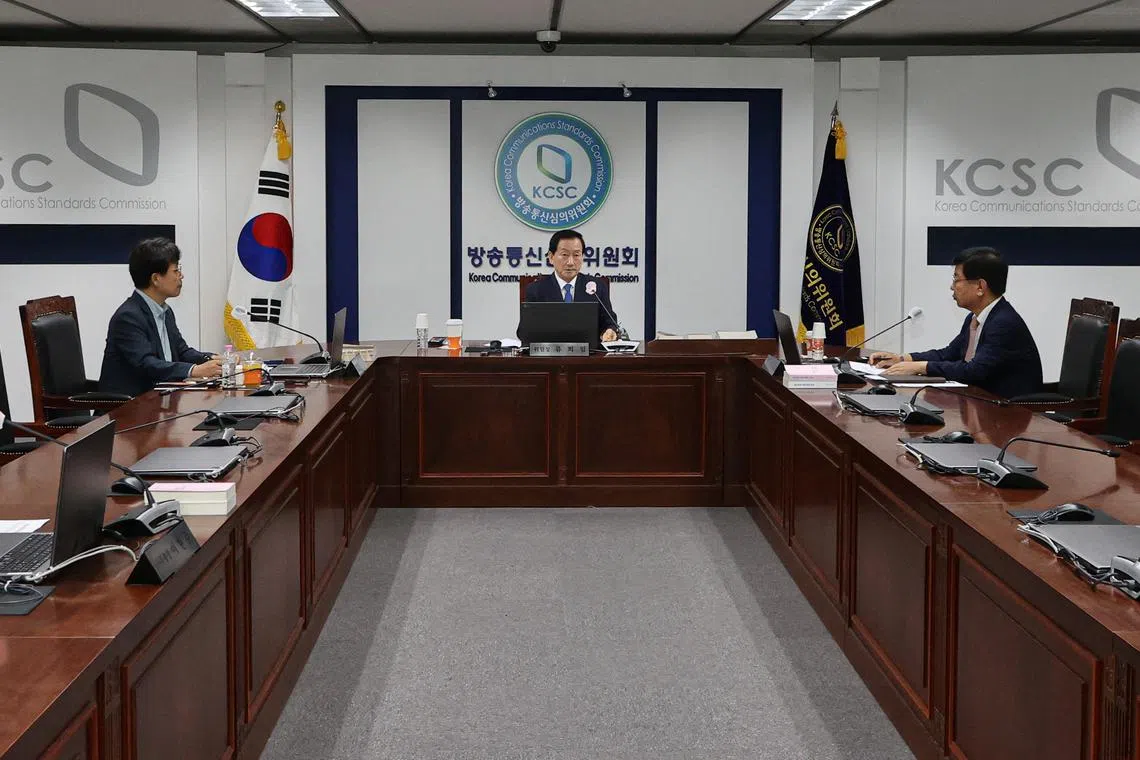South Korea to ask Telegram, other social media firms to help tackle digital sex crimes
Sign up now: Get ST's newsletters delivered to your inbox

Korea Communications Standards Commission chairman Ryu Hee-lim said there are plans to set up a consultative body to enhance communication with social media firms.
PHOTO: REUTERS
Follow topic:
SEOUL - The South Korean authorities said on Aug 28 that they plan to ask Telegram and other social media platforms to more actively help with the deletion and blocking of sexually explicit deepfake content, part of measures aimed at tackling the growing problem.
The steps come amid public and political outrage after several domestic media outlets reported that sexually explicit deepfake images and videos of South Korean women were often found in Telegram chatrooms.
A 24-hour hotline for victims will also be set up and the number of regulatory personnel monitoring digital sex crimes will be doubled from the current number of 70, the Korea Communications Standards Commission said.
The Korean National Police Agency also said it will make a seven-month push to crack down on online sex crimes.
The media watchdog plans to set up a consultative body to enhance communication with social media firms about deleting and blocking sexual deepfake content, its chairman Ryu Hee-lim told a meeting on the issue.
“Production, possession and distribution of deepfake sex crime videos are a serious crime that destroys the individual dignity and personal rights,” he said.
In addition to Telegram, the commission said it would be seeking cooperation from X as well as Meta’s Facebook and Instagram and Google’s YouTube.
None of the companies responded to Reuters’ requests for comment.
Criticism of Telegram in South Korea has coincided with the arrest of Mr Pavel Durov,
The number of deepfake sex crime cases in South Korea has surged from 156 in 2021, when data was first collated, to 297 so far in 2024, with most of the perpetrators being teenagers, according to police data.
The victims are usually female and include school students as well as female soldiers in South Korea’s military.
Telegram is now the main platform of choice for perpetrators of sexually explicit deepfake content, said Ms Kim Yeo-jin, the head of the Korea Cyber Sexual Violence Response Centre, adding that police need to do more.
In many cases, victims have been told by the police that filing a report would not be effective because the content was on Telegram, making it tough to catch the criminals, she said.
Police officials did not immediately respond to a Reuters request for comment.
Police data published by lawmaker Kim Young-bae in 2020 showed that police made seven requests to Telegram via e-mail for help with investigations into digital sex crimes between February and August of that year, and Telegram did not respond to any of them.
South Koreans have made more than 6,400 requests for help to the Korea Communications Standards Commission in 2024 to have sexually explicit deepfake content taken down. That compares with nearly 7,200 cases in 2023 in which the commission agreed to help take down the content. REUTERS

